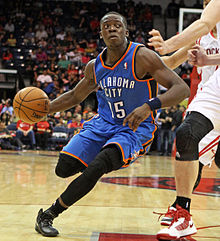 There was plenty of money spent on free agents by NBA teams this offseason.
There was plenty of money spent on free agents by NBA teams this offseason.
But how many of them spent their money smartly? How many spent their money like drunken sailors? And how many spent their money in a way that left you scratching your head?
In this edition of the Three-Man Weave, members of the Sheridan Hoops staff take a look at the Eastern Conference and determine which teams made the best and worst signings of the offseason.
1. Which move was the best value for the money?
CHRIS SHERIDAN, PUBLISHER: Cleveland re-signing LeBron James at $23 million for one year (with an option year that he will decline). If not for the existence of the max contract, James would be making $50 million – and earning every penny of it. Next year, he will sign for four years and more than $140 million, and he will still be a bargain. Baseball players have been getting $150-200 million mega-contracts for several years now (see Rodriguez, Alex), and that is a dying sport.
 CHRIS BERNUCCA, MANAGING EDITOR: With all due respect to LeBron James, who would probably be worth $50-60 million in an open market, the best value was Miami getting Amar’e Stoudemire at the veteran’s minimum of $1.5 million. After Stoudemire was traded to Dallas last season, he played primarily against reserves and averaged 10.8 points in 16.8 minutes while shooting 58 percent with a 22.3 PER. He can play alongside either Chris Bosh or Hassan Whiteside and will be a good pick-and-roll partner for Goran Dragic. Honorable mention to Toronto signing Luis Scola for $3 million and Chicago re-signing Aaron Brooks for $1.27 million.
CHRIS BERNUCCA, MANAGING EDITOR: With all due respect to LeBron James, who would probably be worth $50-60 million in an open market, the best value was Miami getting Amar’e Stoudemire at the veteran’s minimum of $1.5 million. After Stoudemire was traded to Dallas last season, he played primarily against reserves and averaged 10.8 points in 16.8 minutes while shooting 58 percent with a 22.3 PER. He can play alongside either Chris Bosh or Hassan Whiteside and will be a good pick-and-roll partner for Goran Dragic. Honorable mention to Toronto signing Luis Scola for $3 million and Chicago re-signing Aaron Brooks for $1.27 million.
MICHAEL SCOTTO, COLUMNIST: The best bang for the buck was the Heat, who added a proven scorer to the bench in Amar’e Stoudemire for a miniscule $1.5 million. Stoudemire has shown the ability to score in short bursts, and reduced minutes will give him a better chance to remain healthy throughout the season and compete for Sixth Man of the Year. Honorable mentions: Mo Williams gives Cleveland proven bench scoring on a cheap two-year, $4.3 million deal; Aaron Brooks proved to be a capable backup and an important insurance policy for Derrick Rose and re-signed with Chicago on a one-year minimum deal; and Gary Neal to Washington on a one-year, $2.1 million deal is excellent value for a proven playoff performer and knockdown shooter.
RELATED: Who won the East’s offseason? | Who won the West’s offseason?
2. Which move was the worst value for the money?
SHERIDAN: Amir Johnson getting $24 million over two years from Boston. I like to point to this one as the epitome of the new money dynamic in the NBA, because Johnson will make $500,000 more than MVP and recently crowned champion Stephen Curry over the next two seasons, should the Celtics pick up the second-year option. But then there is the more simple point: Johnson is an OK defensive presence and can get you a few  boards, but he is a mid-level exception type player, not a $12 million a year guy. Props to his agent.
boards, but he is a mid-level exception type player, not a $12 million a year guy. Props to his agent.
BERNUCCA: The Cavaliers re-signed Iman Shumpert for $40 million over four years and it says here that at no time during the length of that deal will Shumpert be a $10 million player. I don’t care how well he defends. Shumpert has never averaged 10 points per game, has a career shooting mark below 40 percent and averages more turnovers than foul shots. His best season PER is 11.7. He shot 25 percent in the Finals with no one guarding him. He is a reserve who got starter money simply for being in the right place at the right time. Dishonorable mention to New York giving Derrick Williams, who does nothing but dunk, $10 million for two years.
SCOTTO: Shumpert’s deal with the Cavaliers. How does a guy who hasn’t averaged 10 points per game, is an unreliable shooter (.396) and a bench player get $10 million annually? Don’t get me wrong. Perimeter defense is important, but not for $10 million annually. Kudos to Shumpert’s agent on this deal. He’s the real MVP, as Kevin Durant would say.
3. Which move was the biggest head-scratcher?
SHERIDAN: Reggie Jackson getting $80 million over five years from the Pistons. Hey, the guy is a good player. Nobody is taking that away from him. But my reaction is kind of like John Wall’s reaction: Those guys are worth the same money? Well, welcome to the new economics, where jealousy and contract envy now plays a big part in union dynamics. Can’t wait to hear Curry weigh in on this issue as it becomes more acute a year from now.
 BERNUCCA: Toronto giving Cory Joseph $30 million for four years. I understand the Raptors needed to fortify their backcourt after trading Greivis Vasquez and (inexplicably) letting Lou Williams walk. And despite drafting Delon Wright, they probably didn’t feel comfortable plugging him in directly behind point guard Kyle Lowry. And yes, Joseph is from Canada, which makes him an easy sell. But you have to wonder if his development will continue now that he has left the system-conscious Spurs, who seem to make every role player better than they actually are. And if the Raptors really believe Joseph is a $7.5 million player, then why did they draft Wright?
BERNUCCA: Toronto giving Cory Joseph $30 million for four years. I understand the Raptors needed to fortify their backcourt after trading Greivis Vasquez and (inexplicably) letting Lou Williams walk. And despite drafting Delon Wright, they probably didn’t feel comfortable plugging him in directly behind point guard Kyle Lowry. And yes, Joseph is from Canada, which makes him an easy sell. But you have to wonder if his development will continue now that he has left the system-conscious Spurs, who seem to make every role player better than they actually are. And if the Raptors really believe Joseph is a $7.5 million player, then why did they draft Wright?
SCOTTO: Maybe Reggie Jackson of the New York Yankees was worth a five-year, $80 million contract at one time, but will we say the same about the point guard on the Pistons? To be fair, Jackson averaged 17.6 points, 9.2 assists and 4.7 rebounds as the floor general for the Pistons. At 25, he is entering his prime and will be handed the keys to the offense to prove he’s worthy of the massive contract. Wizards All-Star guard and proven playoff performer John Wall certainly wasn’t pleased to be in the same salary ballpark as Jackson.